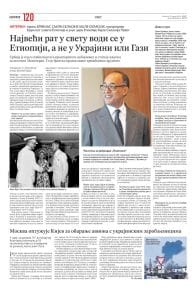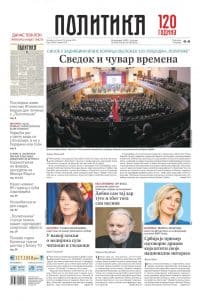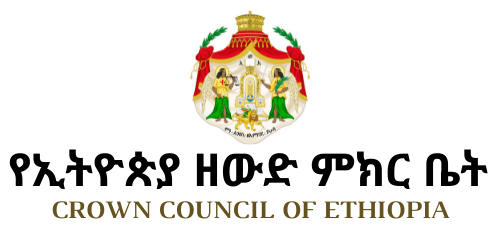Crown Council President Interviewed in Serbian Press
ሐሙስ, ጥር 16 2016 / 25 January 2024
SPEECHES & ARTICLES
THE BIGGEST WAR IN THE WORLD IS BEING FOUGHT IN ETHIOPIA, NOT UKRAINE OR GAZA
1. Your Imperial Highness, can you please share with us a little about yourself and your work?
 As
As President of the Crown Council of Ethiopia, my task is to keep alive the institution of the Solomonic Crown of Ethiopia. This is an institution which goes back some 3,000 years to the union of King Solomon and Queen Makeda of Saba: the Queen of Sheba. The Crown Council itself is an ancient institution, but was formalized in Ethiopia’s Constitution in 1955, and acts as the Crown during periods of interregna, such as this present period which began with the overthrow of my Grandfather, Emperor Haile Selassie I in 1974.
President of the Crown Council of Ethiopia, my task is to keep alive the institution of the Solomonic Crown of Ethiopia. This is an institution which goes back some 3,000 years to the union of King Solomon and Queen Makeda of Saba: the Queen of Sheba. The Crown Council itself is an ancient institution, but was formalized in Ethiopia’s Constitution in 1955, and acts as the Crown during periods of interregna, such as this present period which began with the overthrow of my Grandfather, Emperor Haile Selassie I in 1974.
My task today, with the Crown Council, is to restore peace and harmony to Ethiopia and fulfill the Emperor’s wish for a fully democratic, constitutionally guided nation which can enable elective government to deliver prosperity to a united Ethiopian people.
The civil war, at present, is something which consumes millions of lives and also consumes my every waking and sleeping moment. The Crown is thankfully being called upon again as an instrument of mediation, and a symbol of common values between the many Ethiopian peoples. We are there for all the Ethiopian people, at home and abroad, and for the Ethiopia Orthodox Tewahedo Church, as well as for our wonderful Muslim and other Ethiopian groups.
2. Your grandfather Emperor Haile Selassie is regarded by many as one of the most important figures of the 20th century and was admired by many Serbs and, indeed, by people throughout the former Yugoslavia. What are some of your memories of him? What is his legacy today?
My memories of my Grandfather are vivid and strong. He took a major role in raising me in the Palace after the passing of my father at a young age. But what is amazing is that his vision for Ethiopia remains profoundly relevant: He sought a world of cooperation and open negotiation. He sought to implement, with his proposed Constitutional revision of 1973-74, to fully implement a Constitutional Monarchy and parliamentary democracy which would have rivaled the transparency and dignity of the British and European crowns, with whom he worked closely.
He was a great admirer of Serbia and Yugoslavia because of its strong Orthodox Christian heritage and was happy to become close to the Serbian People and to help raise the consciousness of the Church there after decades of communism.
3. Since the murder of your grandfather in 1975, Ethiopia has suffered enormously and today is experiencing a terrible war and a humanitarian crisis. Can you tell us about the dire situation today in Ethiopia and what needs to be done?
It would take too much time to tell the full background to today’s suffering in Ethiopia, but we must acknowledge that it is the biggest war in the world at present, with millions killed in the past three years, including a million or so in the past year due to literally genocidal campaigns against various ethnic groups and religious elements who are being targeted for their wish that Ethiopia remains as a close federation of peoples linked by common factors. We are suffering some tens of millions of internally displaced persons at present, and their plight is dire.
This is a war which is greater than the Russia-Ukraine war and the Israel-HAMAS war, despite their grave and unhappy circumstances. But Ethiopia gets no help toward an end to its internal war, which is why my great preoccupation is to help resolve the situation in our homeland, and to protect the sanctity of the Ethiopian Church, the Ethiopian Muslim community, and our great historic way of life.
4. How do you see the future of Ethiopia in light of its unique history, culture and strategic geopolitical location?
Ethiopia is one of the great nations capable of exerting a positive influence on the stability of the Red Sea, and thence the Suez Canal linkage between Euro-Atlantic trade and the Indo-Pacific. Chaos and instability in the Horn of Africa are the enemy of stability and prosperity for the world, and Ethiopia – once its crisis can be calmed – can and will work with the regional powers, such as Egypt and Israel, to create a new economic zone which links the Mediterranean and the Red Sea.
The Ethiopian civilization is the oldest continuous civilization in the world. The restoration of its prestige and authority will send a signal that human values can be sustained, and that strength and justice will prevail over the region’s lands and waterways. This is where and how Ethiopia, for example, will work once again with the Balkan states and the Orthodox world to help bring calm and rules back to the trading environment.
5. You are the President of the Crown Council of Ethiopia. Can you tell us about the Council and its mission and activities?
The Crown Council, as it is presently configured, is the remaining Constitutional Body of the 1955 Constitution, and has been recognized internationally as the legal embodiment of the Ethiopian Crown. We have kept the Council alive during the interregnum, and since the passing of the most recent Emperor, who appointed me as President of the Council.
We are not a “government-in-exile”. The Crown’s duty is to be above politics, and to help ensure that governments may be freely elected in Ethiopia to express the day-to-day will of the people. Politics is often divisive – sometimes necessarily so, with the exchange of differing ideas – but the Crown’s role is to keep national values and ideals alive, and to ensure that the people remain protected and comforted. The Crown must be able to be seen as a guardian of constitutional rights for the Ethiopian people.
6. In addition to explaining the role of the Crown Council, could you touch on additional issues?
We have seen the exhaustion of republics in the world today as they enter a period of divisiveness in all levels of society. Constitutional monarchies have evolved since the end of absolute monarchies or executive monarchies in the 17th and 18th centuries. Today, the concept of constitutional monarchy is there to provide that unifying factor for a national culture and values, leaving the political debate to parties and movements.
The Crown is there to represent enduring values and identity, and there are many governments and parties who come and go along that enduring pathway.
Monarchies today are the world’s most stable and prosperous societies. They have a level of prestige which enhances the dignity and honor of their societies, and they attract investment, trade, tourism, and trust. Ethiopia soared in the respect and imagination of the world during the reigns of Emperor Haile Selassie I and Emperor Menelik II, for example.
We will elevate the prestige of Ethiopia again, and raise the hopes, dignity, and productivity of Ethiopians once more. And we can do that in harmony with the national church, the Ethiopian Orthodox Tewahedo Church, as well as with our distinctly Ethiopian Muslim brethren and the Ethiopian Muslim community under the Sultan of the Afars.
7. Ethiopia and Serbia (and the former Yugoslavia) have traditionally had a very good relationship in the past. How do you see the future of this relationship and how can it be developed further?
Serbia is the key to stability and prosperity in the Balkans, and therefore it is critical to the stability of the Eastern Mediterranean. It is a fellow Orthodox Christian society. Of course, we will reignite our friendship, trade, and mutual prosperity.
I hope that I can visit Serbia sooner, rather than later. Not only out of love for the historical Serbian-Ethiopian relationship nourished by my grandfather, but also because of my respect for the Serbian Crown and what it can do to restore prestige to the Serbian People. Revived prestige heals many of the wounds of the past sufferings of Ethiopian and Serbian people.
8. Do you have any other message for the readers of Politika, the oldest daily newspaper in the Balkans?
How can we pay sufficient attention to the 120th anniversary of Politika? It has kept flying the flag of Serbian dignity through more than a century of great suffering and difficulties. God bless Politika. May we see it prospering and crusading through another century and more.
Grandfather and grandson
Prince Ermias lives in the Washington metropolitan area today. He was born on June 14, 1960. He lost his father when he was two years old and he was raised by his grandfather, who was crowned Emperor on November 2, 1930, and in the same year the American magazine TIME declared the Emperor the Person of the Year.
At that time, Ethiopia was the only independent country in Africa, besides Liberia. HIM Haile Selassie was one of Josip Broz Tito’s greatest political friends. He was celebrated in a famous Yugoslav song as the “Emperor of Africa and Asia”.
Prince Ermias spent a significant part of his life in Ethiopia; he finished elementary school there, and continued his studies in Great Britain. He has two sons – Christian and Rufael.
(Edited for clarity. Translation courtesy of Col. George Bougias, GCEM, GOSE, RML and Jelica Bougias, CSE, RML. We are also indebted to Jelica Bougias of Politika, for making the Politika interview happen.)


